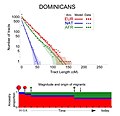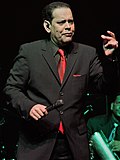Dominicans
Dominicans[edit]
The term "Dominicans" can refer to people from the Dominican Republic, a country located on the island of Hispaniola in the Caribbean, or to members of the Dominican Order, a Catholic religious order. This article will focus on the people of the Dominican Republic, their culture, history, and demographics.
History[edit]
The history of the Dominican Republic is rich and complex, marked by periods of colonization, independence, and political upheaval.
Pre-Columbian Era[edit]
Before the arrival of Europeans, the island of Hispaniola was inhabited by the Taíno people, an indigenous group who called the island "Quisqueya." The Taíno had a rich culture and society, with a population estimated to be in the hundreds of thousands.
Colonial Period[edit]
In 1492, Christopher Columbus arrived on the island, claiming it for Spain. The Spanish established the first permanent European settlement in the Americas, Santo Domingo, in 1496. The native Taíno population was decimated by disease, warfare, and enslavement.
Independence[edit]
The Dominican Republic declared its independence from Spain on February 27, 1844, after a long struggle. The country has since experienced periods of occupation, dictatorship, and democratic governance.
Culture[edit]
Dominican culture is a vibrant blend of Taíno, African, and European influences, reflected in its music, dance, food, and traditions.
Music and Dance[edit]
The Dominican Republic is famous for its music and dance, particularly Merengue and Bachata. These genres have gained international popularity and are an integral part of Dominican identity.
Cuisine[edit]
Dominican cuisine is a fusion of indigenous, African, and Spanish influences. Popular dishes include "La Bandera" (rice, beans, and meat), "Mangu" (mashed plantains), and "Sancocho" (a hearty stew).
Demographics[edit]
The Dominican Republic has a population of approximately 10.5 million people. The majority of Dominicans are of mixed European and African descent, with smaller populations of European, African, and indigenous ancestry.
Language[edit]
The official language of the Dominican Republic is Spanish. Dominican Spanish has its own unique accent and vocabulary, influenced by the country's diverse cultural heritage.
Religion[edit]
The predominant religion in the Dominican Republic is Roman Catholicism, although there is a growing presence of Protestant and Evangelical Christian communities.
Economy[edit]
The Dominican Republic has one of the largest economies in the Caribbean and Central American region. Key sectors include tourism, agriculture, and services.
Tourism[edit]
Tourism is a major industry, with millions of visitors each year attracted to the country's beautiful beaches, resorts, and cultural sites.
Agriculture[edit]
Agriculture remains an important part of the economy, with products such as sugar, coffee, and tobacco being significant exports.
See Also[edit]
References[edit]
- "Dominican Republic." Encyclopædia Britannica. Accessed October 2023.
- "History of the Dominican Republic." World History Encyclopedia. Accessed October 2023.
-
Dominicans
-
Dominicans
-
Dominicans
-
Dominicans
-
Dominicans
-
Dominicans
-
Dominicans
-
Dominicans
-
Dominicans
-
Dominicans
-
Dominicans
-
Dominicans
Ad. Transform your life with W8MD's Budget GLP-1 injections from $75


W8MD offers a medical weight loss program to lose weight in Philadelphia. Our physician-supervised medical weight loss provides:
- Weight loss injections in NYC (generic and brand names):
- Zepbound / Mounjaro, Wegovy / Ozempic, Saxenda
- Most insurances accepted or discounted self-pay rates. We will obtain insurance prior authorizations if needed.
- Generic GLP1 weight loss injections from $75 for the starting dose.
- Also offer prescription weight loss medications including Phentermine, Qsymia, Diethylpropion, Contrave etc.
NYC weight loss doctor appointmentsNYC weight loss doctor appointments
Start your NYC weight loss journey today at our NYC medical weight loss and Philadelphia medical weight loss clinics.
- Call 718-946-5500 to lose weight in NYC or for medical weight loss in Philadelphia 215-676-2334.
- Tags:NYC medical weight loss, Philadelphia lose weight Zepbound NYC, Budget GLP1 weight loss injections, Wegovy Philadelphia, Wegovy NYC, Philadelphia medical weight loss, Brookly weight loss and Wegovy NYC
|
WikiMD's Wellness Encyclopedia |
| Let Food Be Thy Medicine Medicine Thy Food - Hippocrates |
Medical Disclaimer: WikiMD is not a substitute for professional medical advice. The information on WikiMD is provided as an information resource only, may be incorrect, outdated or misleading, and is not to be used or relied on for any diagnostic or treatment purposes. Please consult your health care provider before making any healthcare decisions or for guidance about a specific medical condition. WikiMD expressly disclaims responsibility, and shall have no liability, for any damages, loss, injury, or liability whatsoever suffered as a result of your reliance on the information contained in this site. By visiting this site you agree to the foregoing terms and conditions, which may from time to time be changed or supplemented by WikiMD. If you do not agree to the foregoing terms and conditions, you should not enter or use this site. See full disclaimer.
Credits:Most images are courtesy of Wikimedia commons, and templates, categories Wikipedia, licensed under CC BY SA or similar.
Translate this page: - East Asian
中文,
日本,
한국어,
South Asian
हिन्दी,
தமிழ்,
తెలుగు,
Urdu,
ಕನ್ನಡ,
Southeast Asian
Indonesian,
Vietnamese,
Thai,
မြန်မာဘာသာ,
বাংলা
European
español,
Deutsch,
français,
Greek,
português do Brasil,
polski,
română,
русский,
Nederlands,
norsk,
svenska,
suomi,
Italian
Middle Eastern & African
عربى,
Turkish,
Persian,
Hebrew,
Afrikaans,
isiZulu,
Kiswahili,
Other
Bulgarian,
Hungarian,
Czech,
Swedish,
മലയാളം,
मराठी,
ਪੰਜਾਬੀ,
ગુજરાતી,
Portuguese,
Ukrainian











